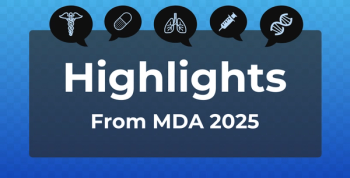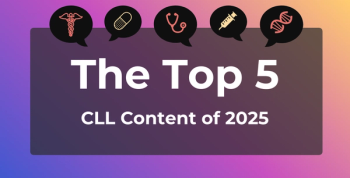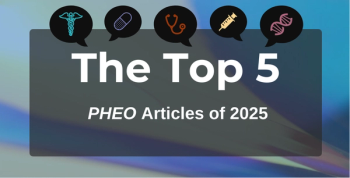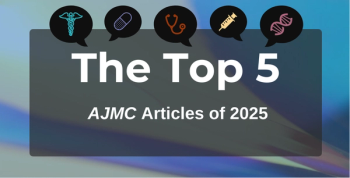
Highlights from the 2025 Muscular Dystrophy Association (MDA) Conference include clinical updates, expert insights, and breaking trial findings.

Christina is the associate editorial director of The American Journal of Managed Care® (AJMC®) and Population Health, Equity & Outcomes, and joined AJMC in 2016. She oversees the publication of the print journals, from manuscript submission to publication, and works with the editors in chief and editorial boards to promote the journals.
She has a BS in public health from Rutgers University. You can connect with Christina on LinkedIn.

Highlights from the 2025 Muscular Dystrophy Association (MDA) Conference include clinical updates, expert insights, and breaking trial findings.

This year’s most-read articles on CLL highlighted research and insights on personalized therapy, long-term remission, and next-generation cell treatments.

Readers of PHEO this year found value in research, conference coverage, and insights that touched on health outcomes and care quality.

Readers of AJMC gravitated to articles on technology, policy, and clinical workflows, reflecting the pursuit of improved quality and responsible spending.

Experts convened in Cleveland, Ohio, on November 11, 2025, to discuss the evolution of cardio-renal-metabolic care from treatment of individual diseases to team-based, population-focused care.

Experts at a roundtable in Boston, Massachusetts, on November 3, 2025, discussed improving early Alzheimer disease diagnosis, addressing workforce and equity gaps, and expanding access to new disease-modifying therapies.

In 2025, each issue of Population Health, Equity & Outcomes has featured a profile of a health system leader transforming care in their area of expertise. This issue spotlights a conversation with B. Joy Snider, MD, PhD, professor of neurology at Washington University in St Louis.

Clinicians and health system leaders met in Portland, Oregon, on October 21, 2025, to discuss the evolving options for treating Alzheimer disease and multiple sclerosis.

To mark the 30th anniversary of The American Journal of Managed Care (AJMC), each issue in 2025 includes a special feature: reflections from a thought leader on what has changed—and what has not—over the past 3 decades and what’s next for managed care. The December issue features a conversation with AJMC Co–Editors in Chief A. Mark Fendrick, MD, director of the Center for Value-Based Insurance Design and a professor at the University of Michigan in Ann Arbor; and Michael E. Chernew, PhD, the Leonard D. Schaeffer Professor of Health Care Policy and the director of the Healthcare Markets and Regulation Lab at Harvard Medical School in Boston, Massachusetts.

Diet and wellness impact multiple sclerosis management, enhancing quality of life and reducing fatigue through lifestyle changes and holistic approaches.

Explore how the Veteran Affairs (VA) MS Centers of Excellence enhance veteran care through a hub-and-spoke model, telehealth, and groundbreaking research.

Nurse practitioners play an essential role in diagnosing, treating, and supporting individuals living with Alzheimer disease.

Early intervention and effective therapies are transforming multiple sclerosis management, enhancing patient outcomes, and delaying disability progression.

To mark the 30th anniversary of The American Journal of Managed Care, each issue in 2025 includes a special feature: reflections from a thought leader on what has changed—and what has not—over the past 3 decades and what’s next for managed care. The November issue features a conversation with Laurie C. Zephyrin, MD, MPH, MBA, senior vice president for achieving equitable outcomes at the Commonwealth Fund. This interview has been edited for length and clarity.

Darla Chapman, DNP, ARNP, University of Washington, speaks on the evolution of Alzheimer diagnosis, emphasizing early detection and innovative biomarkers.

Premiums for coverage on the ACA marketplaces are set to jump by an average of 26% next year, even before the expiration of subsidies is factored in.

ACOs serving patients with complex needs are on the rise, but policy changes are needed to support providers treating special populations.

AstraZeneca has struck a deal with the Trump administration to sell lower-priced drugs via TrumpRx, following a similar agreement with Pfizer.

The FDA has approved a second generic version of oral mifepristone, used to terminate pregnancy, after determining it is identical to the branded drug.

To mark the 30th anniversary of The American Journal of Managed Care, each issue in 2025 includes a special feature: reflections from a thought leader on what has changed—and what has not—over the past 3 decades and what’s next for managed care. The October issue features a conversation with Ge Bai, PhD, CPA, professor of accounting at Johns Hopkins Carey Business School and professor of health policy and management at Johns Hopkins Bloomberg School of Public Health in Baltimore, Maryland.

There are clear benefits to starting biologic therapy earlier for severe asthma, as well as initiation patterns by ethnicity, according to data at ERS Congress 2025.

Artificial intelligence (AI) holds the potential to democratize precision oncology, but it must be implemented thoughtfully.

In a time of skyrocketing oncology drug costs, the role of pharmacists in managing patients’ treatment and keeping care in the outpatient setting is more urgent than ever.

Panelists discussed the ingredients of successful handoffs at the time of cancer diagnosis and ways to collaborate as screening capabilities evolve.

As therapeutic advances enable patients with cancer to live longer, greater attention is needed to support the goal of survivorship, starting at diagnosis.

Cardiologists, nephrologists, and payers met in Scottsdale, Arizona, on August 26, 2025, to share insights on how team members can work together, empowered by data, to achieve value-based management of cardio-renal-metabolic syndrome.

In 2025, each issue of Population Health, Equity & Outcomes will feature a profile of a health system leader transforming care in their area of expertise. This issue spotlights a conversation with Marisa Rogers, MD, MPH, chief medical officer at Oak Street Health.

To mark the 30th anniversary of The American Journal of Managed Care, each issue in 2025 includes a special feature: reflections from a thought leader on what has changed—and what has not—over the past 3 decades and what’s next for managed care. The September issue features a conversation with Dora Hughes, MD, MPH, chief medical officer and director of the Center for Clinical Standards and Quality at CMS.

To mark the 30th anniversary of The American Journal of Managed Care (AJMC), each issue in 2025 includes a special feature: reflections from a thought leader on what has changed—and what has not—over the past 3 decades and what’s next for managed care. The August issue features a conversation with Charles N. (Chip) Kahn III, MPH, the president and CEO of the Federation of American Hospitals and a longtime member of the AJMC editorial board.

To mark the 30th anniversary of The American Journal of Managed Care (AJMC), each issue in 2025 includes a special feature: reflections from a thought leader on what has changed—and what has not—over the past 3 decades and what’s next for managed care. The July issue features a conversation with David J. Shulkin, MD, a physician and former secretary of the US Department of Veterans Affairs.

Published: September 17th 2020 | Updated:

Published: September 12th 2025 | Updated:

Published: April 1st 2025 | Updated:

Published: March 21st 2023 | Updated:

Published: October 2nd 2025 | Updated:

Published: March 18th 2023 | Updated:

259 Prospect Plains Rd, Bldg H
Cranbury, NJ 08512
© 2025 MJH Life Sciences®
All rights reserved.
